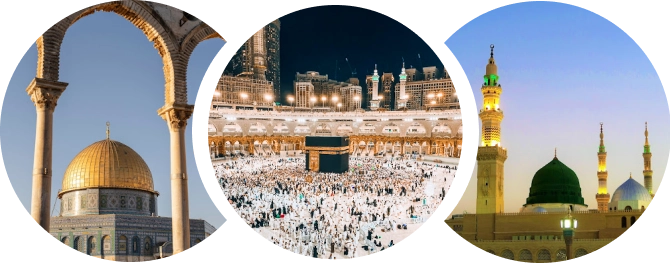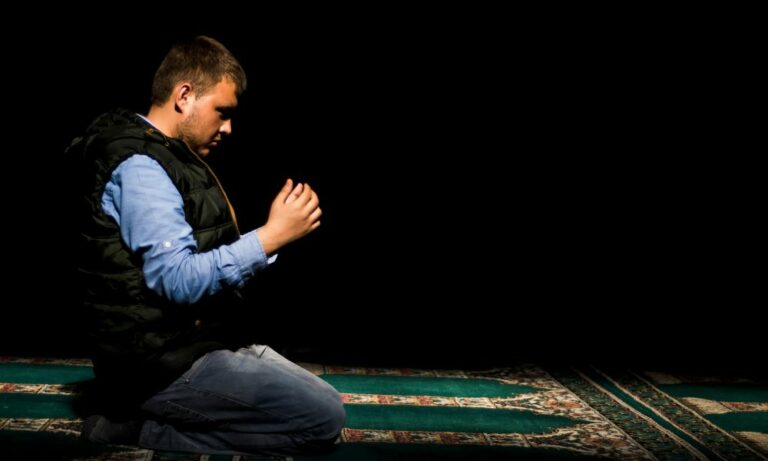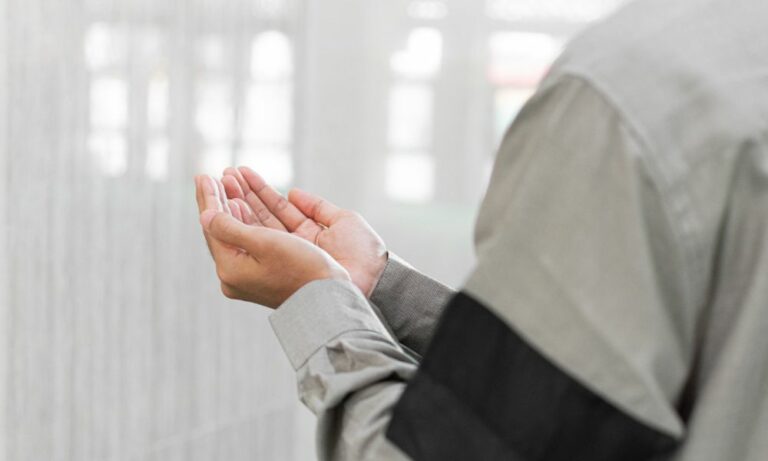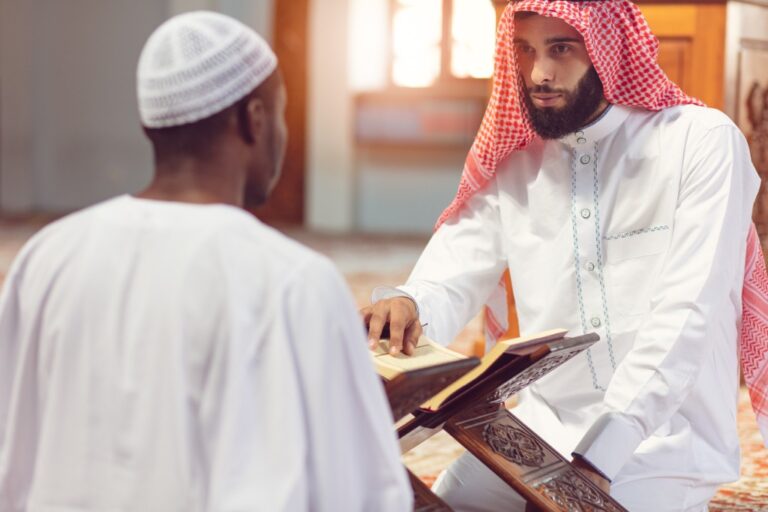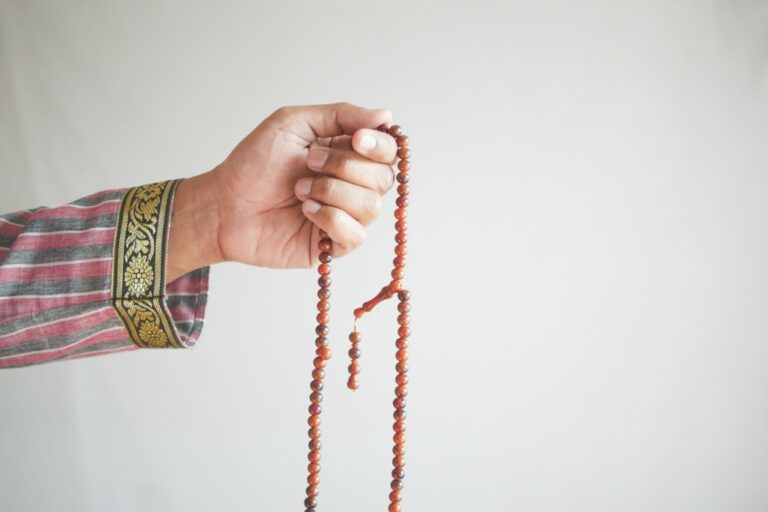Powerful Duas For Healthy Life: Your Ultimate Guide
Are you seeking ways to live a healthier, more fulfilled life? A vital aspect of Islam involves maintaining good health, both physically and spiritually.
This blog post will explore the power of Dua for good health, guiding you through the profound impact these Islamic prayers can have on your well-being.
Let’s unearth these treasures together and foster an enriched life journey!
Understanding the Importance of Dua in Islam


Dua, a powerful act of worship in Islam, establishes a strong bond between Allah SWT and his believer. It is regarded as the most powerful means of communicating with Allah SWT.
Muslims use Duas not only to seek assistance or guidance but also to express gratitude and forgiveness from Allah SWT.
Duas are important tools for seeking Allah SWT’s mercy and healing in various situations, such as illness or pain. Specific Quranic Duas provide pain relief while wiping the area of discomfort.
This practice embodies the inherent belief that health is wealth, and good health is essential in Islam. Prophet Muhammad PBUH has also commanded us to ask for good health:
سَلُوا اللَّهَ الْعَفْوَ وَالْعَافِيَةَ فَإِنَّ أَحَدًا لَمْ يُعْطَ بَعْدَ الْيَقِينِ خَيْرًا مِنَ الْعَافِيَةِ
Ask God for forgiveness and health, for after being granted certainty, one is given nothing better than health.” Mishkat al-Masabih 2489
Consistent recitation of Dua promotes spiritual enhancement, which may improve physical well-being.
Thus, the role of Dua goes far beyond simple religious observance; it is an essential factor in promoting general well-being among believers.
Best Islamic Duas for Good Health
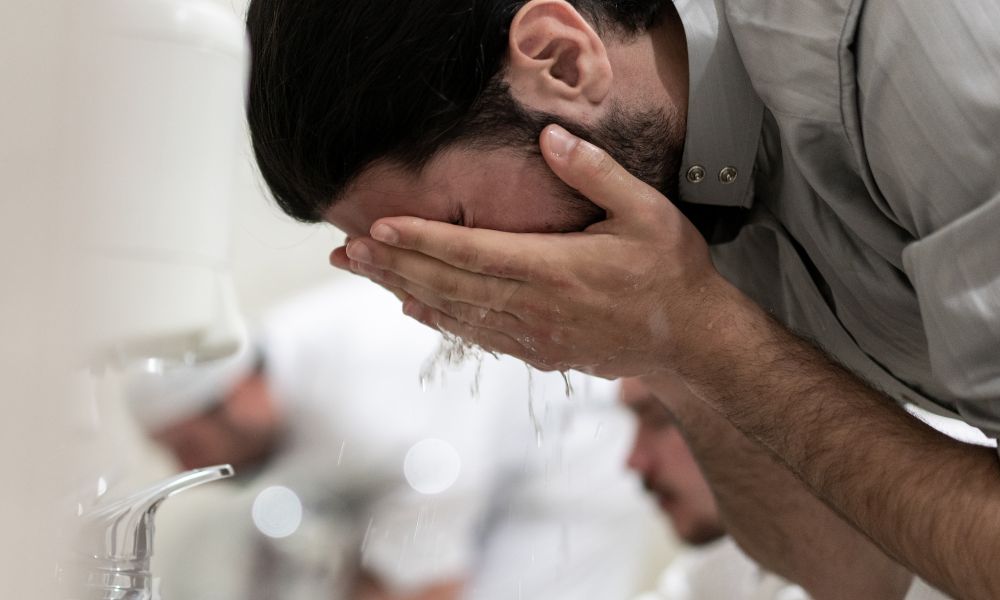

The Quranic Duas for Health and Prophetic Duas for Health are powerful prayers that can aid in maintaining good health.
Quranic Duas for Health
The best Dua for health that you will find in the Quran is Al-Mu’awwidhatayn (Surah Al-Falaq and Surah An-Nas) as both of these Surahs are written in the form of Dua, and they were revealed to the Prophet PBUH when he got inflicted by magic.
Aisha R.A narrated how Prophet Muhammad PBUH used to recite these Surahs:
أَنَّ النَّبِيَّ صلى الله عليه وسلم كَانَ إِذَا أَوَى إِلَى فِرَاشِهِ كُلَّ لَيْلَةٍ جَمَعَ كَفَّيْهِ ثُمَّ نَفَثَ فِيهِمَا فَقَرَأَ فِيهِمَا {قُلْ هُوَ اللَّهُ أَحَدٌ} وَ{قُلْ أَعُوذُ بِرَبِّ الْفَلَقِ} وَ{قُلْ أَعُوذُ بِرَبِّ النَّاسِ} ثُمَّ يَمْسَحُ بِهِمَا مَا اسْتَطَاعَ مِنْ جَسَدِهِ يَبْدَأُ بِهِمَا عَلَى رَأْسِهِ وَوَجْهِهِ وَمَا أَقْبَلَ مِنْ جَسَدِهِ يَفْعَلُ ذَلِكَ ثَلاَثَ مَرَّاتٍ
Whenever the Prophet (ﷺ) went to bed every night, he used to cup his hands together and blow over them after reciting Surat Al-Ikhlas, Surat Al-Falaq, and Surat An-Nas and then rub his hands over whatever parts of his body he was able to rub, starting with his head, face and front of his body. He used to do that three times. Sahih al-Bukhari 5017
If you look at the translation of these two Surahs, then you will realize their power:
Surah Al Falaq
قُلْ أَعُوذُ بِرَبِّ ٱلْفَلَقِ ١ مِن شَرِّ مَا خَلَقَ ٢ وَمِن شَرِّ غَاسِقٍ إِذَا وَقَبَ ٣ وَمِن شَرِّ ٱلنَّفَّـٰثَـٰتِ فِى ٱلْعُقَدِ ٤ وَمِن شَرِّ حَاسِدٍ إِذَا حَسَدَ ٥
Say, ˹O Prophet,˺ “I seek refuge in the Lord of the daybreak from the evil of whatever He has created, and from the evil of the night when it grows dark, and from the evil of those ˹witches casting spells by˺ blowing onto knots, and from the evil of an envier when they envy.”
Surah An Na
قُلْ أَعُوذُ بِرَبِّ ٱلنَّاسِ ١ مَلِكِ ٱلنَّاسِ ٢ إِلَـٰهِ ٱلنَّاسِ ٣ مِن شَرِّ ٱلْوَسْوَاسِ ٱلْخَنَّاسِ ٤ ٱلَّذِى يُوَسْوِسُ فِى صُدُورِ ٱلنَّاسِ ٥ مِنَ ٱلْجِنَّةِ وَٱلنَّاسِ ٦
Say, ˹O Prophet,˺ “I seek refuge in the Lord of humankind, the Master of humankind, the God of humankind, from the evil of the lurking whisperer— who whispers into the hearts of humankind—from among jinn and humankind.”
Are you wondering why Prophet Muhammad PBUH recited Surah Al-Ikhlas alongside these Surahs? This is because this Surah praises Allah SWT and his attributes, and praising Him is part of the Dua etiquette.
But how often should we recite these Surahs? Prophet Muhammad PBUH said:
“”اقرأ: قل هو الله أحد، والمعوذتين حين تمسي وحين تصبح، ثلاث مرات، تكفيك من كل شيء
“Recite Surat Al-Ikhlas and Al-Mu’awwidhatain (Surat Al-Falaq and Surat An-Nas) three times at dawn and dusk. It will suffice you in all respects.” Riyad as-Salihin 1456
- Are you searching for the most accurate Athan and Prayer times? You have come to the right place! Feel free to click on the hyperlink.
Dua in Ahadith For Good Health
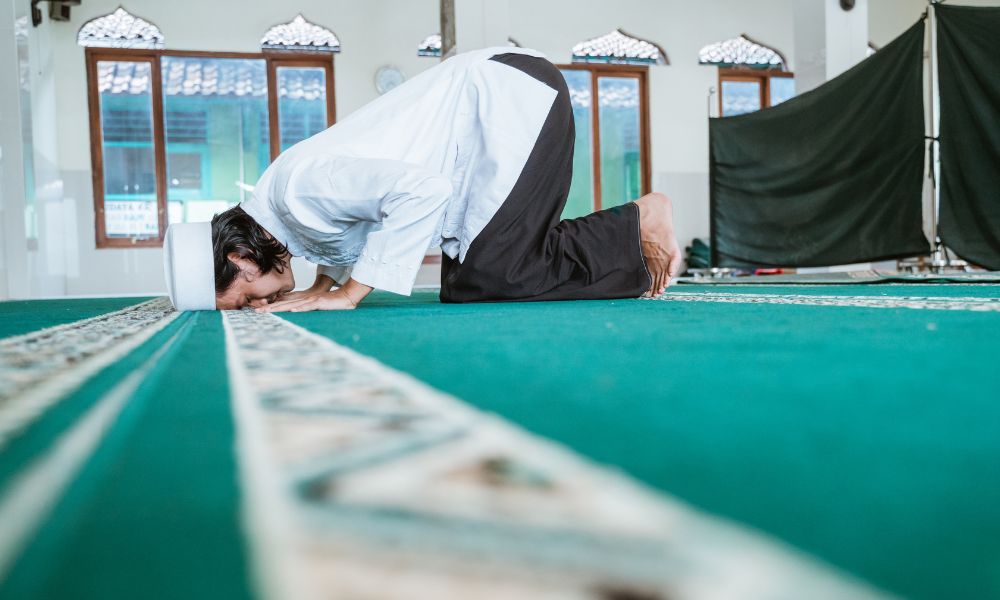

In several hadiths, Prophet Muhammad PBUH described health as one of the greatest blessings:
‘There is no harm in wealth for someone who has taqwa, but health for the person who has taqwa is even better than wealth. Cheerfulness is a blessing.'” Al-Adab Al-Mufrad
Prophet Muhammad PBUH conveyed to us several Duas to ask Allah SWT for good health, we will mention some of them below:
إِنِّي أَعُوذُ بِكَ مِنْ زَوَالِ نِعْمَتِكَ، وَتَحَوُّلِ عَافِيَتِكَ، وَفُجَأَةِ نِقْمَتِكَ، وَجَمِيعِ سَخَطِكَ.
O Allah, I seek refuge with You from the disappearance of Your blessing and from the loss of good health and Your sudden vengeance and all of Your anger.'” Al-Adab Al-Mufrad 685
مَنْ قَالَ بِسْمِ اللَّهِ الَّذِي لاَ يَضُرُّ مَعَ اسْمِهِ شَىْءٌ فِي الأَرْضِ وَلاَ فِي السَّمَاءِ وَهُوَ السَّمِيعُ الْعَلِيمُ ثَلاَثَ مَرَّاتٍ لَمْ تُصِبْهُ فَجْأَةُ بَلاَءٍ حَتَّى يُصْبِحَ وَمَنْ قَالَهَا حِينَ يُصْبِحُ ثَلاَثَ مَرَّاتٍ لَمْ تُصِبْهُ فَجْأَةُ بَلاَءٍ حَتَّى يُمْسِيَ
If anyone says three times: “In the name of Allah SWT, when Whose name is mentioned nothing on Earth or in Heaven can cause harm, and He is the Hearer, the Knower” he will not suffer sudden affliction till the morning, and if anyone says this in the morning, he will not suffer sudden affliction till the evening. Sunan Abi Dawud 5088
“اللهم إني أعوذ بك من البرص والجنون، والجذام، وسيئ الأسقام”
Allahumma inni a’udhu bika minal-barasi, wal- jununi, wal-judhami, wa sayyi’il-asqami’ (O Allah! I seek refuge in You from leukoderma, insanity, leprosy and evil diseases).” Riyad as-Salihin 1484
There are a few more Duas about health in the books of Hadith, but we have mentioned the short ones here as they are easier to memorize. This allows you to easily incorporate them into your daily life InshAllah.
- Download Muslim Sadiq app, and enjoy all top-notch features for everyday activities!
Etiquettes of Making Dua
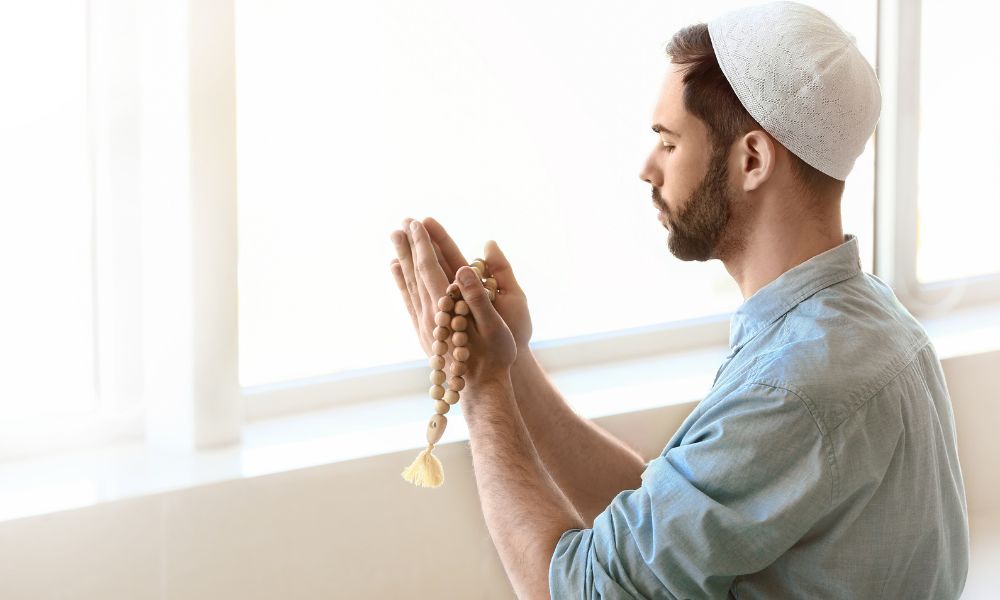

Now that you are aware of the Duas for good health, we will next discuss the etiquette of making Dua.
Have Trust in Allah SWT
When it comes to making Dua, we need to completely trust that Allah SWT will hear and respond to our Dua.
واذا سالك عبادي عني فاني قريب اجيب دعوة الداع اذا دعان فليستجيبوا لي وليؤمنوا بي لعلهم يرشدون
“Wa-itha saalaka ibadee Aannee fa-innee qareebun ojeebu daAwata adda’i itha da’ani falyastajeeboo lee walyu’minoo bee la’allahum yarshudoon” Source
(Muhammad), if any of My servants ask you about Me, tell them that the Lord says, “I am near; I accept the prayers of those who pray.” Let My servants answer My call and believe in Me so that perhaps they may know the right direction. Source
Praise Allah SWT and Send Salat Upon the Prophet PBUH Before Making Dua


In a hadith, Prophet Muhammad PBUH instructed us to praise Allah SWT and send Salat upon the Prophet before making Dua:
“The Prophet (ﷺ) heard a man supplicating in his Salat, but he did not send Salat upon the Prophet (ﷺ), so the Prophet (ﷺ) said: ‘This one has rushed.’ Then he called him and said to him, or someone other than him: ‘When one of you performs Salat, then let him begin by expressing gratitude to Allah and praising Him. Then, let him send Salat upon the Prophet (ﷺ), then let him supplicate after that, whatever he wishes.'” Jami` at-Tirmidhi 3477
Become a Beggar in Front of Allah SWT
“ “إِذَا دَعَا أَحَدُكُمْ فَلاَ يَقُلِ اللَّهُمَّ اغْفِرْ لِي إِنْ شِئْتَ وَلَكِنْ لِيَعْزِمِ الْمَسْأَلَةَ وَلْيُعَظِّمِ الرَّغْبَةَ فَإِنَّ اللَّهَ لاَ يَتَعَاظَمُهُ شَىْءٌ أَعْطَاهُ
When one of you makes a supplication (to his Lord), one should not say: O Allah, grant me pardon, if Thou so likest, but one should beg one’s (Lord) with a will and full devotion, for there is nothing so great in the eye of Allah which He cannot grant. Sahih Muslim 2679a
You shouldn’t be making Dua like, “Oh, Allah, please give me this or that, if you can…” Instead, you should say, “Oh Allah, please, please give me this…”
Be Patient
“ يُسْتَجَابُ لأَحَدِكُمْ مَا لَمْ يَعْجَلْ يَقُولُ دَعَوْتُ فَلَمْ يُسْتَجَبْ لِي
“The invocation of anyone of you is granted (by Allah SWT) if he does not show impatience (by saying, “I invoked Allah but my request has not been granted.”) Sahih al-Bukhari 6340
Allah SWT always accepts your Dua at the appropriate time, so be patient, and if Allah SWT does not accept your Dua, be grateful because Allah SWT is deciding something better for you.
Raise Your Hands in Front of Him
إِنَّ رَبَّكُمْ تَبَارَكَ وَتَعَالَى حَيِيٌّ كَرِيمٌ يَسْتَحْيِي مِنْ عَبْدِهِ إِذَا رَفَعَ يَدَيْهِ إِلَيْهِ أَنْ يَرُدَّهُمَا صِفْرًا
Your Lord is munificent and generous and is ashamed to turn away empty the hands of His servant when he raises them to Him. Sunan Abi Dawud 1488
The most common way is to make a cup of your hands and face it towards the sky.
- Read Al Quran along with transliteration and interpretation in the easiest way possible.
How to Incorporate Dua into Daily Routine for Better Health
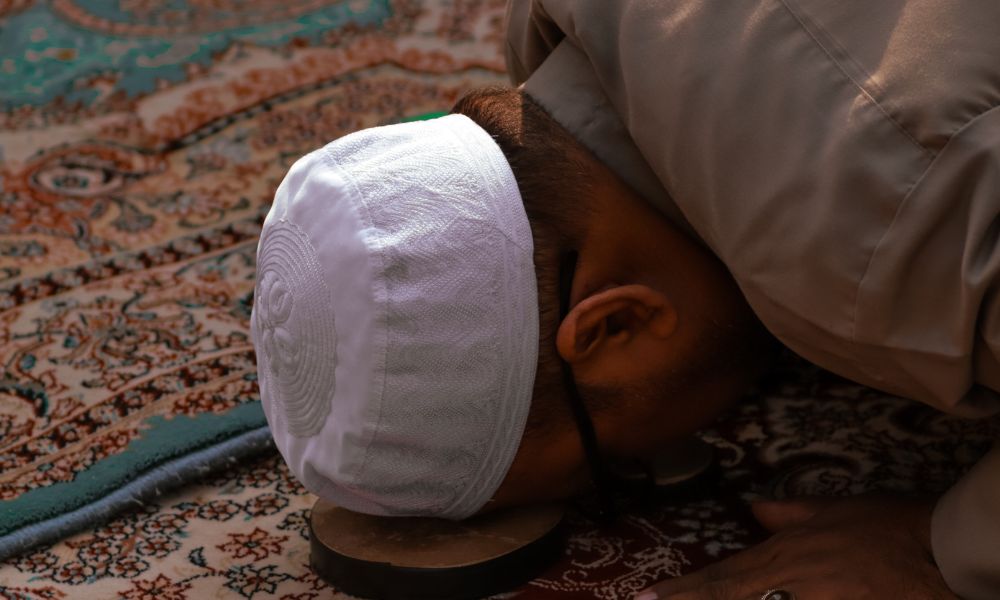

Incorporating Dua into your daily routine can significantly improve your health and well-being. Here are some practical ways to do this:
- Each day, begin by reciting the Quranic Duas for Health. This practice can help you start your day on a positive note.
- Include such Duas in your five daily Salah (Islamic prayers). It is a beautiful way to remember Allah SWT and ask for His protection from harm.
- Before eating, recite “Bismillah”, which means “in the name of Allah,” with faith in the blessings of Almighty Allah SWT.
- Adopt Islamic health tips, such as avoiding harmful substances like cigarettes, alcohol, and pork, as the Quran emphasizes.
- Practice Surah Al-Nas, Surah Al-Falaq, and Surah-Ikhlas before going to bed.
- Regularly visit doctors for check-ups and screening tests, such as breast or colon cancer detection, while keeping the powerful Dua for visiting the Sick in mind.
- Use Duas such as the ones mentioned above during times of sickness or pain.
- Looking for the Islamic holidays and important dates? Please click the hyperlink to access the up-to-date list.
Conclusion
Reciting Islamic Duas for good health is a spiritual practice that can also help people feel better in their bodies. The powerful words of the Quran and Prophet Mohammad PBUH teach us how to take care of our bodies, honor their sacredness, and pray for divine healing when we are sick.
Properly understanding and regularly reciting these prayers can help you live a healthy life. This is a sign of Allah SWT’s kindness. Every Muslim should say these Duas daily as a sign of faith and gratitude to Almighty Allah SWT.
FAQs
What is a Dua for a healthy life?
A Dua for a healthy life is a prayer or supplication to Allah SWT for good health and well-being.
How do I perform the powerful Duas for a healthy life?
Setting aside some dedicated time, facing Mecca, raising your hands in supplication. And sincerely asking Allah SWT for good health and protection is how you can perform the powerful Dua for a healthy life.
Can anyone recite the powerful Duas for a healthy life?
Yes, anyone who believes in the power of prayer, regardless of age, or gender. Or religious background, can recite the powerful Dua for a healthy life.
What are some benefits of reciting the Duas for a healthy life?
Reciting the Duas for a healthy life can bring comfort, peace of mind, faith. And spirituality and strengthen one’s connection with Allah SWT by seeking His blessings, and guidance.
Powerful Duas for a Healthy Life: Your Ultimate Guide
Are you looking for ways to live a healthier, more fulfilling life? A vital aspect of Islam involves maintaining good health, both physically and spiritually. This blog post will explore the power of prayers for good health, and guide you through the profound impact these Islamic prayers can have on your health. Let's discover these treasures together and foster a rich life journey!Understand the importance of supplication in Islam


Best Islamic supplications for good health
Quranic supplications for health
The best supplication for health that you will find in the Qur’an is the two Mu’awwidha (Surat Al-Falaq and Surat Al-Nas), as these two surahs are written in the form of a supplication and were revealed to the Prophet, may God bless him and grant him peace. When magic struck him. Aisha, may God be pleased with her, narrated how the Prophet Muhammad, may God’s prayers and peace be upon him, used to recite these surahs: When the Prophet, may God’s prayers and peace be upon him, went to bed every night, he would bring his hands together, then blow on them and recite in them: “Say, He is God.” He is one} and { Say, “I seek refuge in the Lord of Jurisprudence.” {Say, “I seek refuge in the Lord of mankind.” Then he wiped with them whatever he could of his body, starting with them on his head, face, and so on He touched his body and did this three times. Whenever the Prophet, may God bless him and grant him peace, went to bed every On the night, he brought his hands together, then blew on them after reciting Surat Al-Ikhlas, Surat Al-Falaq, and Surat Al-Nas, then wiped his hands over whatever part of his body he had. He was able to rub his body, starting with his head, face and front of his body. He did this three times. Sahih al-Bukhari 5017 If you look at the translation of these two surahs, you will realize their power: Al-Falaq Say, I seek refuge in the Lord of creation XNUMX from the evil of what He has created XNUMX And from the evil of the darkness when it approaches XNUMX And from the evil of blowing into knots XNUMX And from the evil of an envier when he is envious XNUMX Say, O Prophet, I seek refuge in the Lord of creation from the evil of what He was created from the evil of the night when it falls, and from the evil of sorcerers who perform ruqyah on breathing In the contract, and from the evil of the envier when he envies.” Surat An-Na Say, I seek refuge in the Lord of the people XNUMX The King of the people XNUMX The God of the people XNUMX From the evil of the deceitful whisperer XNUMX He who whispers in the hearts of the people XNUMX From Paradise and the people XNUMX Say, O Prophet, I seek refuge in the Lord of the people, Master People are the God of people from the evil of the whispering whisperer who whispers into the hearts of people, both jinn and humans. Are you wondering why the Prophet Muhammad, may God bless him and grant him peace, read Surah Al-Ikhlas next to these surahs? This is because this Surah praises God Almighty and His attributes, and praising Him is one of the etiquettes of supplication. But how many times should we read these surahs? The Prophet Muhammad, may God’s prayers and peace be upon him, said: “Read: ‘Say, ‘He is God, One,’” and “Muawwa’in” in the evening and when in the morning, three times, and it is sufficient for you of everything. And Morocco is sufficient for you in all aspects.” Riyadh Al-Saleheen 1456- Are you looking for The most accurate adhan and prayer times? You have come to the right place! Feel free to click on the hyperlink.
Praying in hadiths for health
- Download the Sadiq Muslim App, and enjoy all the premium features for daily activities!
Prayer etiquette


Praise be to God and prayers be upon the Prophet, may God bless him and grant him peace, before supplication


- Read Surah of the Qur’an With voice translation and simultaneous translation in the easiest possible way.
How to incorporate supplication into your daily routine for better health


- Start every day by reciting Quranic supplications for health. This practice can help you start your day on a positive note.
- Include such supplications in your five daily prayers (Islamic prayers). It is a beautiful way to remember God Almighty and ask for His protection from harm.
- Before eating, recite “Bismillah,” which means “in the name of God,” with faith in the blessings of God Almighty.
- Follow Islamic health advice, such as avoiding harmful substances such as cigarettes, alcohol and pork, as emphasized in the Holy Quran.
- Practicing Surat An-Nas, Surat Al-Falaq, and Surat Al-Ikhlas before going to sleep.
- Visit doctors regularly for examinations and screening tests, such as screening for breast or colon cancer, while keeping in mind the strong dua for visiting sick people.
- Use prayers like the ones above in times of illness or pain.
- Are you looking for Islamic holidays And important dates? Please click the hyperlink to access the updated list.

